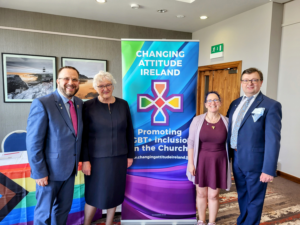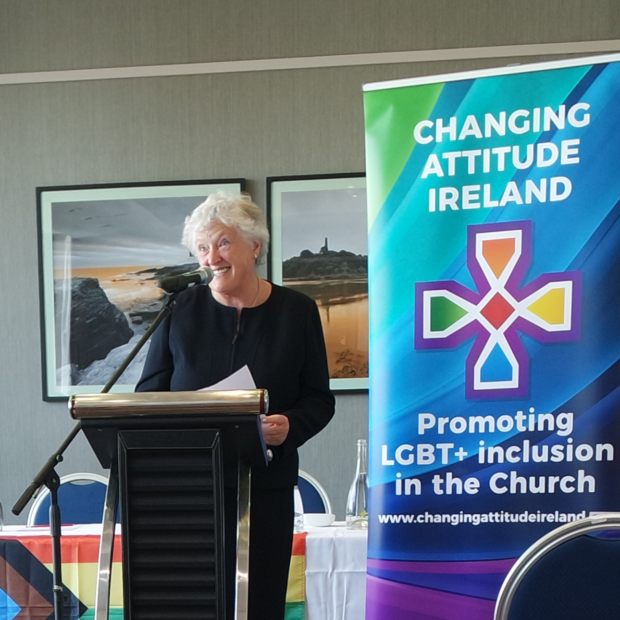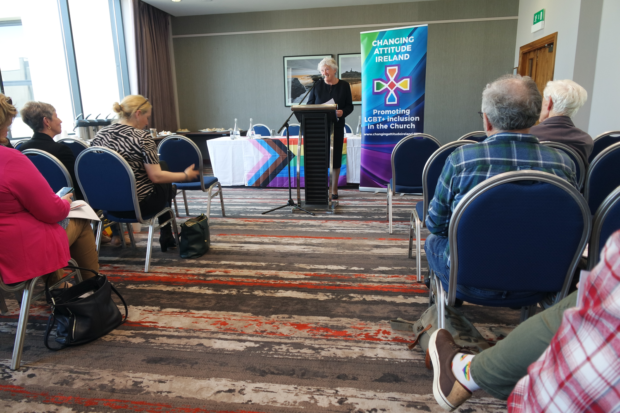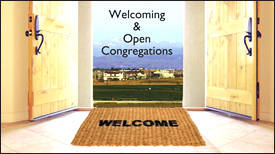For the first time since 2019, we had a presence at the Church of Ireland General Synod. Despite initially not being allocated space to set up a stall, we were able to avail of a vacant space for the Saturday. It was great to engage with those who are supportive, inquisitive and who just wanted to know more about the work we do.
We were also delighted to welcome all those who attend our lunchtime fringe event where Maria Jansson delivered such an incredible talk by on the power of scapegoating in our society from the Shoah to current European movements of hate and why the churches are losing ground every minute they stay silent on the rights and inclusion of all minorities.
Maria’s talk was challenging, emotional and thought provoking and I would recommended those who have differing views on human sexuality to read the text, which provides food for thought for us all as we navigate the road ahead to inclusion for all.
THE WAY FORWARD?
A CHANGED ENVIRONMENT
Thank you, Changing Attitude Ireland, for the invitation to talk. May I suggest a change of name for your group. IAC – Ireland’s Attitudes have Changed… and big time.
1. Attitudes to sexuality and religion have undergone enormous changes in the last number of years. The game has changed so much that the church’s infighting on matters sexual is deemed not just offensive but as compounding the utter irrelevance of religion in an increasing number of people’s lives… young and old.
2. Churches have emptied; congregations may be partially returning but we have learnt that the great message of resilience and hope given us by Christ’s resurrection was not witnessed to by church leaders during that time of trial. Many clergy worked their hearts out during the Pandemic to keep congregations afloat, alive and sane but many clergy and people were utterly abandoned by a church they loved and served. People have walked and it is not just the young. They discovered that God was with them when a church was not.
3. It would be very interesting to ask every member of synod how the young in their families regard religion, not the young who have no choice but teenagers and young adults. If all that remains of religion is tribal identity and a lingering sentimentality regarding rites of passage and Christmas, it’s time to start some honest talk about the actual state of the church. I am half Swedish. When I went into ministry my nephew, a bright and good person, a loving husband and father was perplexed and commented ‘But it has nothing to do with real life Maria, it’s irrelevant!’ 25 years ago Sweden was post Christian, now Ireland is very close to that secularism.
4. Yet there abounds a deep and real hunger for God in all of us, a need for a moral compass, for meaning, for hope, for tribe. As Christians who find all these in Christ, but we have lost the ability to communicate this good news in an authentic manner. Our language is cliched and lazy, unrooted in the existential reality of people’s lives. People are tired of being talked at, over or about, tired of the same clap trap endlessly repeated with no acknowledgement of their actual concerns. So they walk and don’t look back.
5. Many question if they have (or even want) any place in church at all. To be LGBTQ+ and Christian requires immense courage, given the ubiquity of systemic homophobia. Women’s bodies are, and always have been, the loci of religion’s cultural wars. The rise of fundamentalism appals anyone espousing a thinking faith. In fact, a lot of people do not fit the religious bill, are excluded, or self- exclude and a magnificent spiritual heritage is reduced to a deadening preoccupation with inane homogeneity, devoid of vision, decency, relevance, energy, love or hope… in fact, devoid of God!
SCAPEGOAT
In the face of such a changed religious environment, rather than ask the searching questions that demand listening, facing challenging change and hard decisions, there exists the ever-present social instinct to scapegoat. The idea of scapegoat, going back to the Jewish feast of Yom Kippur or Atonement, was that two goats would be used, one as a sacrifice of atonement to God, another sent out into the desert or thrown into the abyss, with it carrying the sins of the community.

Changing Attitude Ireland at the 2023 Synod. L-R: Mark Bowyer (Chair), Maria Jansson, Karen Godfrey (Secretary) and Scott Golden (Former Chair).
Antisemitism: Ubiquitous antisemitism for centuries across Europe was utilised by National Socialism. But it was not just Jews who became objects of hate. I love Berlin, move there if 20 years younger and apart from it amazing cultural life, the manner in which it has dealt with its past is an example to the world.
Sachsenhausen concentration camp outside Berlin was built in 1936 to imprison, use as forced labour, torture and systematically murder opponents of the Nazi regime, Jews, Roma and Sinti, homosexuals, journalists, Soviet prisoners of war, theologians and ‘undesirables’. It became the model for all camps. There was a special section there for the torture and murder of homosexuals.
Ethnic genocide: Rwanda: between 7 April to 15 July 1994 up to 800,000 Tutsi were massacred;
Islamophobia: July 1995 during the Bosnian civil war, in the town of Srebrenica, 8000 Muslim men and boys were murdered;
Xenophobia: Trump’s vilification of Mexican migrants, will be ever forget the image of the caged toddler!
Putin’s ‘holy war’ against Ukraine, legitimated by Russian Orthodoxy Nationalism: Brexit and the vilification of Europe;
Systemic Racism: Direct provision centres here in Ireland
Bigotry: Northern Ireland’s civil war, tit for tat killings of protestants and Catholics in the 70s and 80s
Sexism: lack of gender diversity in church leadership, government business etc etc etc . Listen to women priests on the systemic misogyny.
The one thing in common in all scapegoating is the social vulnerability of the scapegoat, to be ‘other’ is bad. Homogeneity is good.
JESUS THE SCAPEGOAT
But what has all this to do with us? Scapegoating is a means of rallying the populus and re-establishing homogeneity in a given group. From Paul and early texts from Tertullian the Jewish understanding of the sacrificial scapegoat (a much later wording) became applied to Christ, as the atoning sacrifice upon whom the sins of the world were set and in whom we find our redemption. He is the one sent into the wilderness, cast into the abyss of death and in whom our sins are forgiven, and resurrection given.
He was the powerless one, the target of religious and political treachery, regarded as a threat to the status quo. I never cease to be appalled at the brutality of his death, the betrayal by his friends, the political expediency of his enemies and how expendable that special life was. Could I as his mother or friend have stayed by him and watched him being tortured to death? Would I have hid for safety when the pack turned on him? Would I have cheered ‘Hosanna’ and days later roared ‘Crucify him’?
We, his followers today, live under the fantasy that we would have stayed loyal, risked all, given our lives. We claim to be his witnesses in our age. Yet as Christians, we have blood on our hands; we are part of a long tradition of condemning others: Jews, slaves, people of colour, Muslims, women. ‘Crucify’ is roared by the pack in modern tropes when encountering any challenge to our circumscribed world view.
We proclaim Christ as the one for all atoning sacrifice, the scapegoat of atonement, the man of sorrows , acquainted with grief. In his suffering he walked the route of every person that has been the victim of prejudice, hate, violence, abuse, rejection, banishment, demeanment, injustice, torture, murder. God entered our humanity in Christ at our breaking point, at the nadir of human existence. God’s identification with humankind was not in power and its abuse but in powerlessness. And it was from there that he, and we are raised.
5 Let the same mind be in you that was* in Christ Jesus,
6 who, though he was in the form of God, did not regard equality with God as something to be exploited,
7 but emptied himself, taking the form of a slave, being born in human likeness. And being found in human form,
8 He humbled himself and became obedient to the point of death— even death on a cross.
9 Therefore God also highly exalted him and gave him the name that is above every name, 10 so that at the name of Jesus every knee should bend, in heaven and on earth and under the earth, 11 and every tongue should confess that Jesus Christ is Lord, to the glory of God the Father. Phil 2:2-11
We do not hear the voice of God in those who roared ‘Crucify’. The scary bit is that through the ages, albeit proclaiming Christ as our Redeemer, we inflict upon others the very opprobrium to which he was subjected. Changing Attitudes Ireland should not need to exist, but it is vital to challenge ubiquitous religious hypocrisy.
Ministry is privileged territory for people often entrust you with their life stories. Listening to a gay man’s experience of homophobia is chastening, banishment from a teaching post, banishment from his church; listening to a gay woman who knows she is deeply loved by God but can find no church that celebrates that love; listening to the immense struggles for authenticity of a person who is or has undergone the anguish of transitioning.
In every instance, I heard of the pain of the scapegoat, the outsider, the powerless, the voiceless. ‘By force and by law he was taken, would anyone plead his cause?’ I believe with all my heart that Christ is there right at the heart of that rejection and pain, offering hope, dignity, and redemption. I do not believe Christ can be found in the voices of hatred and rejection.
What you see depends on where you stand. Over twenty-five years ago I was a religion teacher in Finglas, a ‘deprived area’ at a time of very high unemployment. I read the parable from Matthew 20:1-19 of the generous employer to a group of 15-year-olds. The verse, ‘9 When those hired about five o’clock came, each of them received the usual daily wage’ caused absolute outrage.
Kids from families with employment saw no reason for the ‘scroungers’ to get the same as the hardworking. That parable was proof that Jesus hadn’t a clue, was a sap, a hippy dippy type who didn’t get the real world. Then one girl stood up and roared ‘My da is always last in the queue for work, he is deaf, he cannot sign and no matter how often he applies for work, he never even gets an interview. Jesus was spot on; he knew what it was last to be last in line.’ A ferocious argument arose in the group, and I let them at it, and for three classes each faction held their ground vociferously. The lesson learned by all was that Jesus controversially sided with the powerless.
In our scapegoating of others, we are not on the side of Christ, no matter how we justify ourselves.
THE WAY FORWARD?
I began this talk with a chastening look at the church and I hope this crisis becomes the means whereby really honest conversations and decisions are made, wherein we humbly reflect on the reality that in many, many ways we have buried the pearl of great price in self-serving mediocrity and cant.
We have ceased to witness to the radical call of love from Christ, to love the stranger and therein walk Christ’s way. The world we live in is a crude and vicious place for minorities on any grounds, populism as we have seen on late in the UK and America, is on the rise and the demonisation of Ukrainian refugees is attempting to gain traction here. In times of flux, the rallying cry ‘crucify’ unites the mob. Will the desert journey through which we have come in the pandemic lead to a new covenant, a renewed faith and ethic?
In the destabilising reality that is church we are at a crossroads. The tried and tested rallying of the troops under the banners of hatred in homophobia, transphobia and the ubiquitous misogyny persists within church as in society. But this is not of Christ for in every act of scapegoating, we participate in the scapegoating of Christ.
So is there a future for religion? I dearly hope so, but not if all it offers is hate and despair, the demonisation of people on grounds of gender, ethnicity or race. Then there is a total betrayal. The church carries within its hypocrisy the seeds of its own demise. Yet, I believe with all my heart when we follow Christ, really follow, radically follow, and learn a love so wide that we are challenged, stretched beyond our smug certainties, we will know redemption.
I believe that when we shut up and listen to the silenced, we will hear a fresh and new gospel of hope. Then we might witness authentically, not just as disparate individuals, but as a community to a powerful message of hope and love in an age crying out for light. When we side with the scapegoated, when we talk the talk and stand for justice and what is right, there is no need for preaching. That truth shines.
19 I call heaven and earth to witness against you today, that I have set before you life and death, blessing and curse. Therefore, choose life, that you and your offspring may live. Deut 30:19




